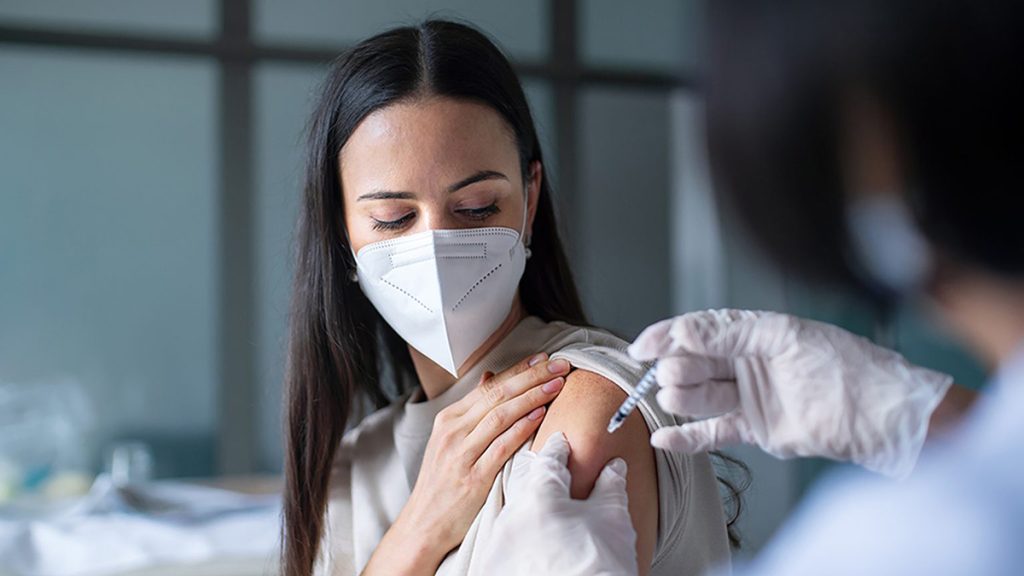Finding common ground: The interplay of community and health care

A new study from University of Missouri researcher Monique Luisi reveals that communities that had good COVID-19 vaccination experiences were more likely to get other vaccines
June 17, 2024
Contact: Courtney Perrett, 573-882-6217, cperrett@missouri.edu
Simple, clear conversations between health care providers and their patients can save lives. For University of Missouri science communication expert Monique Luisi, those conversations are crucial not only for a successful doctor’s visit but also for the preservation of public health.
In her latest study, which inspected the social, cultural, political and personal factors that influence whether people are hesitant to get vaccines, Luisi found communities that had positive COVID-19 vaccination experiences were more likely to get other vaccines, including the human papillomavirus (HPV), shingles and flu vaccines.
“This research provides a glimmer of hope for leveraging existing vaccination opportunities,” Luisi said, noting that many vaccines are recommended over the course of a person’s lifetime, including HPV at age 9, shingles at age 50 and a flu vaccine every year.
“It’s vital for health professionals to meet people where they are in their understanding of vaccines,” Luisi said. “Figuring out how to talk about vaccines in a way that’s organic but increases a person’s opportunities to get needed vaccines consistently across their life course is very important to an individual’s health as well as for public health.”
As a next step, Luisi plans to investigate what factors drive vaccine hesitancy in specific communities and how health communicators can best approach those conversations.
A passion for discovery
Luisi learned the importance of effective science communication early in life. As a precocious 4-year-old, she helped care for her mother, who had suffered a series of strokes that left her temporarily unable to talk or walk. Back then, Luisi tried her best to interpret the medical jargon used by her mother’s doctors. Over time, she realized it was often up to her to translate their words for her mom, who otherwise would’ve been left with more questions about her treatments.
That experience and similar ones in Luisi’s childhood set the foundation that drives her passion to help practitioners translate technical terminology into familiar language that everyday people can understand and utilize to best care for themselves.
Now, as an assistant professor of strategic communication in the Missouri School of Journalism, Luisi strives to understand the barriers that prevent effective communication between health providers and the communities they serve.
“I was exposed to the health system at a young age, and my experiences there are helping inform my research,” Luisi said. “How people in health care talk to people matters and can affect their health outcomes. That’s why I’ve devoted my career to researching how a person’s identity and experiences influence how they perceive diseases and treatments.”
Building community confidence
For Luisi, health communication is best when it’s a grassroots, individualized effort. Because the internet and social media platforms are saturated with misinformation, it’s more effective for providers to initiate a conversation in an intimate setting where people have a chance to respond outside of the digital echo chamber.
“A lot of what we do as health communicators is try to build vaccine confidence and educate folks to combat misinformation,” Luisi said. “For that to be successful, we have to build trust with the people we’re talking to, which is where community partners come in.”
Gathering a community of people together to talk about their symptoms, share ideas for treatments and support one another can be particularly beneficial for public health, Luisi said. It also helps to involve local, trusted medical practitioners instead of relying on medical figureheads with no community ties.
“Hosting mobile clinics, going to places where people congregate, and involving local community stakeholders are going to prove vital in connecting with people,” Luisi said. “But more than anything, it’s listening to people and letting them know that their concerns are genuinely heard, even if the provider feels that their concerns aren’t medically legitimate.”
Luisi says such action is essential in containing infectious diseases and protecting public health.
“Vaccines only work if people take them,” Luisi said. “Effective communication helps support the science behind vaccines — saving lives and preserving public health.”
“Pandemic antecedents — Exploring predictivity and relationships between COVID-19 vaccine uptake and influenza, shingles, and HPV vaccination” was published in Vaccine.
Updated: June 17, 2024